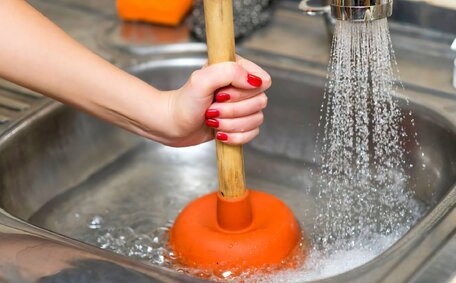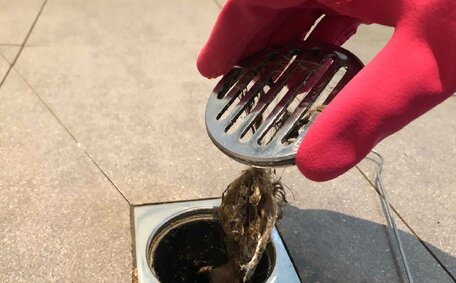Recognizing the Signs of a Blocked Drain
Several signs may suggest a blockage in your drain, such as:
- Water draining very slowly or pooling in sinks/showers
- Gurgling sounds coming from drains
- Unpleasant sewage odours wafting from drains
- Toilets backing up
These symptoms typically indicate a blocked drain needing prompt attention.
Hair, grease, soap scum, and foreign materials often cause blockages. Catching drain problems early can help avoid major backups and damage further down the line. Promptly engage a plumber if you encounter a blocked drain.
Taking Immediate Action When a Drain is Blocked
When you discover a blocked drain, it’s crucial to act fast to mitigate any damage. To limit damage, immediately take these steps when you notice a blocked drain:
- Stop using the affected drain to prevent worsening the blockage.
- Position a bucket under the drain to contain any overflow.
- Make sure you don protective gear like rubber gloves before attempting to plunge the drain.
- Try a plunger first to dislodge the clog.
- If plunging fails, a drain snake or auger could be effective in clearing the clog. Slowly turn the crank while feeding the snake into the pipe.
- Pour a mixture of baking soda and vinegar into the drain, wait for up to 15 minutes, then rinse with boiling water.
- Avoid harsh chemical drain cleaners with gas hot water systems, as they can damage pipes.
- If DIY methods fail, contact a professional to address the blocked drain.
Getting ahead of a drain blockage quickly can prevent contaminated water backing up and flooding. Engage blocked drain specialists, with their expertise and equipment, if necessary. Tackling issues early with proper plumbing services also minimises any extensive repairs needed down the line.
Using Household Items for DIY Drain Cleaning
For small blockages, try these DIY solutions with everyday items before consulting a plumber:
- Boiling water - Pour a full kettle of boiling water carefully down drain to address slow flow. This can help dissolve grease buildup and indicate that drains can benefit from regular hot water flushes.
- Baking soda and vinegar - Combine baking soda and vinegar, pour the mix down the drain to utilise its fizzing action. Cover the drain afterward and let sit for 5-10 minutes before rinsing with hot water.
- Use a straightened wire hanger to dislodge or push through debris causing the clog.
- Plunger - Seal the overflow hole in the sink with a wet rag, then plunge up and down rapidly 10-15 times to apply pressure to the blockage.
Be cautious with boiling water and chemicals. If water starts overflowing at any point, stop immediately. If these temporary fixes don’t resolve the issue or if still water remains, it’s time to call a professional.
Knowing When to Engage a Professional Plumber
There are certain scenarios where attempting to unclog a drain yourself is ill-advised and calling in a professional emergency plumber is crucial, including:
- Raw sewage backing up into your sinks, tubs, or toilets
- Multiple drains within your house are completely blocked
- DIY methods have failed to clear the obstruction
- Drain issues reoccur frequently
- Significant flooding or property damage has resulted
- There are clear indications of a blocked sewer line
- You suspect a collapsed/damaged pipe is causing the issue
Attempting to snake or pressure jet pipes yourself could lead to injury or damage.For fast, efficient drain unblocking and preventative maintenance, contact the certified plumbers at 1300 349 338 or [email protected].
Our team can accurately identify issues and solve recurring drain problems permanently.
Preventing Blocked Drains
To prevent blocked drains, consider the following methods:
- Employ drain strainers in sinks and tubs to catch hair and debris.
- Avoid pouring fats, oil, and grease down the kitchen sink as they solidify in pipes and lead to blockages.
- Opt for liquid soap to minimise soap scum buildup.
- Prevent blockages by not disposing of cooking remnants, coffee grounds, or substantial food waste down drains.
- Regularly use a soda vinegar combination to safely keep pipes clear
- Install hair catchers in showers and bathtubs to prevent clogs.
- You should never flush anything besides toilet paper and human waste down toilets
- Routinely clean plugholes/drain covers to remove accumulated grime and hair
- For plumbing replacements, consider professional installation of larger drains and pipes to improve flow.
Staying vigilant about what goes into your drains is key. Follow these tips to minimise blockages and keep flow water freely through your plumbing system.
Maintaining Proper Drain Health
Keeping your drains clear and flowing properly is an ongoing task that requires vigilance and preventative maintenance. Here are some tips for maintaining healthy drains long-term:
- Flush pipes with boiling water regularly to dissolve grease buildup. The heat melts built-up grease deposits and drains your pipes more effectively.
- Perform a monthly soda and vinegar soak throughout your plumbing system to maintain clear drains. This helps organic matter to go down smoothly and break down, like soap scum or food waste.
- Use drain strainers and filters in sinks/tubs to catch debris. Regularly emptying your traps can prevent blockages caused by debris accumulation.
- Inspect plugholes and pipes under sinks for any accumulated grime or hair buildup and thoroughly clean as needed.
- Consider professional high pressure water jetting every year or two to blast stubborn accumulated gunk out of pipes.
- Have a plumber inspect your main sewer pipes for root ingress or damage if issues arise.
- Be vigilant for slow water movement, as it may signal developing blockages.
Staying on top of drain maintenance and knowing the signs of potential problems can help avoid emergency blockages. Don’t hesitate to call a plumber for professional drain inspections, cleaning and repairs as needed.
Mitigating Emergency Situations
In a blocked drain emergency, act swiftly to prevent flooding or sewage backflow that could damage property or pose health risks.
First, stop using all affected sinks/drains and place buckets underneath to catch overflow. Wear protective equipment like gloves before attempting to plunge or snake the drain. Avoid using harsh chemical drain cleaners as these can damage pipes and worsen spills.
If DIY methods don’t clear the blockage within 30 minutes, immediately call a professional emergency plumber. Time is critical for stopping contaminated water from spreading deeper into walls/flooring and requiring extensive restoration work.
A seasoned plumber has specialised tools and expertise to diagnose and fix drain issues precisely. They can also advise on any necessary pipe repairs/replacements to permanently solve recurrence of blocked drains.
In a sewage overflow crisis with sewerage flooding inhabited areas of your home, evacuate the property and call emergency services right away. Raw sewage can pose severe health risks.
Staying calm, minimising DIY attempts, and promptly contacting drain specialists when comes to issues exceeding your capabilities is key to mitigating emergency situations. This can prevent small clogs from escalating into major home flooding disasters requiring expensive repairs.
Environmentally Friendly Drain Maintenance
As eco-consciousness rises, the plumbing industry is embracing more sustainable practises - and maintaining drains is no exception. There are several environmentally friendly methods you can employ to keep drains clear and pipes flowing properly.
Use Natural Cleaners
Avoid harsh chemical drain cleaners containing toxic ingredients like sodium hydroxide or sulfuric acid. Opt for DIY drain treatments using household staples like baking soda, vinegar or boiling water instead. These break down blockages without releasing harmful fumes or residues.
Install Water-Saving Fixtures
Newer water-efficient faucets, showerheads and toilets with reduced flow can minimise water waste. But the low flow can also inadvertently increase lime and scum deposits inside pipes over time. To combat this, monthly baking soda/vinegar soaks are recommended.
Dispose of FOG Properly
Fats, oils and grease (FOG) poured down kitchen sinks are a major contributor to clogs. Properly disposing of FOG in the bin instead of the drain prevents blockages. Special FOG recycling programmes also now exist in some council areas.
Support Green Plumbing
Seeking out plumbers committed to sustainable practises like fuel-efficient transportation, eco-friendly parts and minimising resource waste supports environmentally responsible drain care. When repairs are needed, be sure to ask how your plumber integrates green initiatives into their work.
Home practices that are eco-friendly contribute to global environmental conservation. Prioritising sustainability in drain maintenance improves system health and helps protect the environment.





